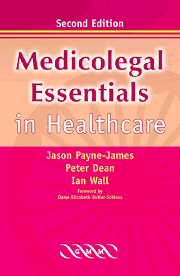Book contents
- Frontmatter
- Contents
- Contributors
- Editors' note for the first edition
- Editors' note for the second edition
- Foreword
- Table of statutes
- Table of cases
- 1 Legal institutions and the legal process
- 2 Human rights and healthcare professionals
- 3 Medical ethics and the forensic physician
- 4 Confidentiality
- 5 Consent to medical treatment
- 6 Professional bodies and discipline
- 7 Complaints in the National Health Service
- 8 The Mental Health Act (England and Wales)
- 9 Death certification and the role of the coroner
- 10 Tissues and organs
- 11 Organ donation
- 12 Living wills
- 13 Euthanasia and end-of-life decision-making
- 14 Abortion and reproductive health
- 15 The Children Act 1989
- 16 Clinical negligence
- 17 Legislation for medicines and product liability
- 18 Clinical trials: ethical, legal and practical considerations
- 19 Medicolegal implications of blood-borne viruses
- 20 Healthcare professionals in court – professional and expert witnesses
- Index
14 - Abortion and reproductive health
Published online by Cambridge University Press: 12 January 2010
- Frontmatter
- Contents
- Contributors
- Editors' note for the first edition
- Editors' note for the second edition
- Foreword
- Table of statutes
- Table of cases
- 1 Legal institutions and the legal process
- 2 Human rights and healthcare professionals
- 3 Medical ethics and the forensic physician
- 4 Confidentiality
- 5 Consent to medical treatment
- 6 Professional bodies and discipline
- 7 Complaints in the National Health Service
- 8 The Mental Health Act (England and Wales)
- 9 Death certification and the role of the coroner
- 10 Tissues and organs
- 11 Organ donation
- 12 Living wills
- 13 Euthanasia and end-of-life decision-making
- 14 Abortion and reproductive health
- 15 The Children Act 1989
- 16 Clinical negligence
- 17 Legislation for medicines and product liability
- 18 Clinical trials: ethical, legal and practical considerations
- 19 Medicolegal implications of blood-borne viruses
- 20 Healthcare professionals in court – professional and expert witnesses
- Index
Summary
INTRODUCTION
The field of human reproduction continues to challenge both the medicolegal and ethical boundaries of common experience. In this chapter the issues relating to abortion and contraception will be summarised and the legal framework under which rulings have been made in relation to fertility treatments will be discussed.
ABORTION
It is a criminal offence contrary to the Offences against the Person Act 1861 and the Abortion Act 1967 (as amended) for any person ‘…with intent to procure the miscarriage of any woman, whether she be or be not with child …’ unless this is carried out under the specific conditions laid down by the Abortion Act.
There has been substantial legal debate over the definition of ‘miscarriage’. Some authorities hold the view that as soon as the ovum is fertilised it is ‘carried’ in the woman's body. This would effectively make postcoital contraception illegal unless carried out in accordance with the Abortion Act. Others take the view that it is only truly carried and thus capable of miscarriage from the time of implantation. In practice the Attorney General's statement in 1983 which favoured the implantation argument means that no prosecution will result from postcoital contraception. Indeed post coital contraceptives are now available as over the counter medicines from pharmacies in the UK.
- Type
- Chapter
- Information
- Medicolegal Essentials in Healthcare , pp. 149 - 158Publisher: Cambridge University PressPrint publication year: 2004



